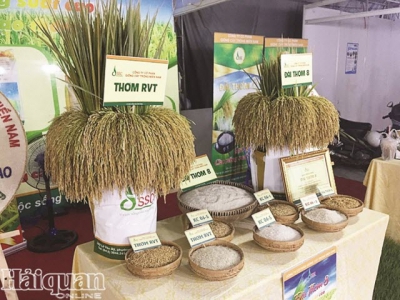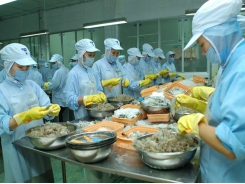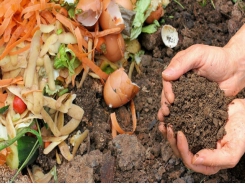Unstable export rice

The quality of rice exports is not high, which is the main reason that Vietnam's rice exports remain precarious, especially when importing countries change policies on technical standards or firms encounter competition from rivals.
Rice exports to major markets all fell in the first five months of this year. Photo: N.H.
Big countries reduce buying
Vietnam's rice exports in the first months of 2019 experienced many adverse developments. With the exception of the Philippines, large, traditional rice import markets such as China, Indonesia and Bangladesh all reduced imports in the first half of the year and are expected to continue for various reasons such as high inventories in China, Indonesia's election year or restoration of post-flood production in Bangladesh.
At the same time, the decline in import from the three markets has resulted in a gloomy result of the three leading exporters, India, Thailand and Vietnam. For Vietnam, exports to these three markets have dropped from 1.44 million tonnes in the first five months of 2018 to only 239 thousand tonnes. Accordingly, the total amount of rice exported in the last five months of Vietnam only reached 2.76 million tonnes, down 6.3% over the same period in 2018, worth about 1.18 billion USD, down 20.4%. The total exports of Thailand to these three markets also decreased by 71.6% compared to the same period last year, making the total rice export volume of Thailand in four months of 2019 decreased by 16% over the same period.
According to the Ministry of Industry and Trade, in recent years, many rice importing countries have had profound changes in policies for rice products such as implementing rice tariffs and changing the way of rice imports allows many sources to participate in G2P tenders to supply rice with competitive prices and higher quality. Many countries have even made efforts to improve domestic production capacity towards food autonomy; Production countries focus on taking advantage of natural conditions, soil, climate, farming conditions to produce quality and branded rice.
Besides these difficulties, Vietnamese rice also faces many new competitors on the market.
Bui Thi Thanh Tam, Vice Chairman of the Vietnam Food Association (VFA) said China is a big importer but will soon become a rice exporter. At present, the largest market of Chinese rice is Africa, which is very cheap and is likely to target Vietnam's markets in the near future. Along with China, after a period of export decline, Myanmar is also rising in rice exports.
For Cambodia, Tam said that with an annual export volume of just over 200,000 tonnes, Cambodia is not a competitor in volume with Vietnam but is a quality competitor because it performs very well on food hygiene and safety. In addition, Bangladesh used to be a huge rice importer of Vietnam, but with high inventories, the government is supporting export enterprises, so Bangladesh will become a rice exporter.
The key is still quality
Analysing the causes of Vietnam's rice export decline, Tam pointed out that consumption of medium and low quality rice decreased due to low demand from the Philippines, Indonesia and Bangladesh. Only Malaysia increased its buying of this type of rice because the price of Vietnamese rice fell to a low level, competing well against Thailand. For China, the enhancement of technical barriers has been done with all agricultural products and foodstuffs, not just rice. Recently, many shipments of Vietnamese rice exported to China have been returned due to failure to ensure quality, many of China's major importers are also reluctant to buy Vietnam's rice, reducing the amount of Vietnamese rice to China over 70% in the first five months of this year.
Agreeing with Tam, Pham Thai Binh, General Director of Trung An High-Tech Agriculture Joint Stock Company, said rice cannot be exported because of the quality of rice seeds instead of blaming technical barriers of the importing country or any other reason. "The current reality is that while rice cannot be sold, but those who need to buy, we do not have to sell it," Binh said. To end this situation, Binh said that it is necessary to make production links between businesses and farmers. "Once farmers still produce without market signals, not according to the needs of buyers, this situation will remain unchanged forever," Binh stressed.
Considering the above problem, Deputy Minister of Industry and Trade Tran Quoc Khanh said Vietnamese enterprises have long considered the world market as a "local market". "Producing without knowing who to sell to, where to go... luckily sold out, if not, it must be dumped," Khanh said. Regarding the link issue, Khanh said the chain of rice industry links now lacks one of the most important links for foreign buyers, as thelinkages between domestic enterprises and farmers are still only input links, but the output is not yet available, there are no enterprises that can establish distribution systems in Africa and the United States. Accordingly, to change this, there should be solutions and time.
“Particularly, enterprises must be honest about the capacity of production, processing and quality control of rice seeds. How to make each rice grain exporting to foreign countries must be of quality, absolutely not to leave the exported goods returned, affecting the prestige not only for their own businesses but also the Vietnamese rice industry,” Khanh said.
Related news
Tools

Phối trộn thức ăn chăn nuôi

Pha dung dịch thủy canh

Định mức cho tôm ăn

Phối trộn phân bón NPK

Xác định tỷ lệ tôm sống

Chuyển đổi đơn vị phân bón

Xác định công suất sục khí

Chuyển đổi đơn vị tôm

Tính diện tích nhà kính

Tính thể tích ao




 ‘New plant breeding methods should not be considered…
‘New plant breeding methods should not be considered…  Vietnam’s rice exports drop, causing big worries
Vietnam’s rice exports drop, causing big worries